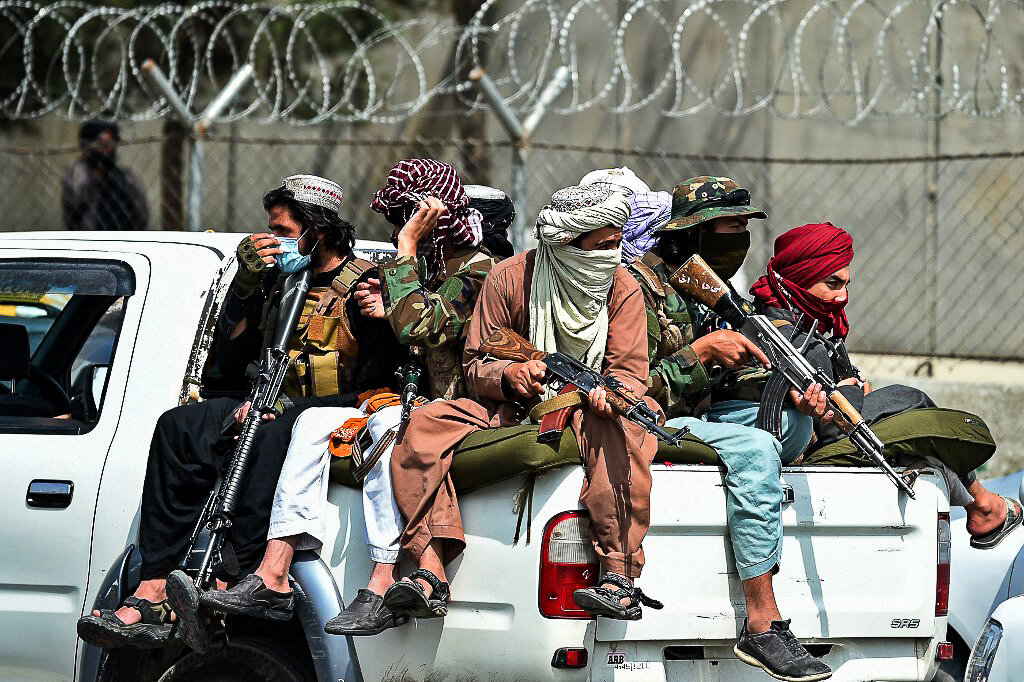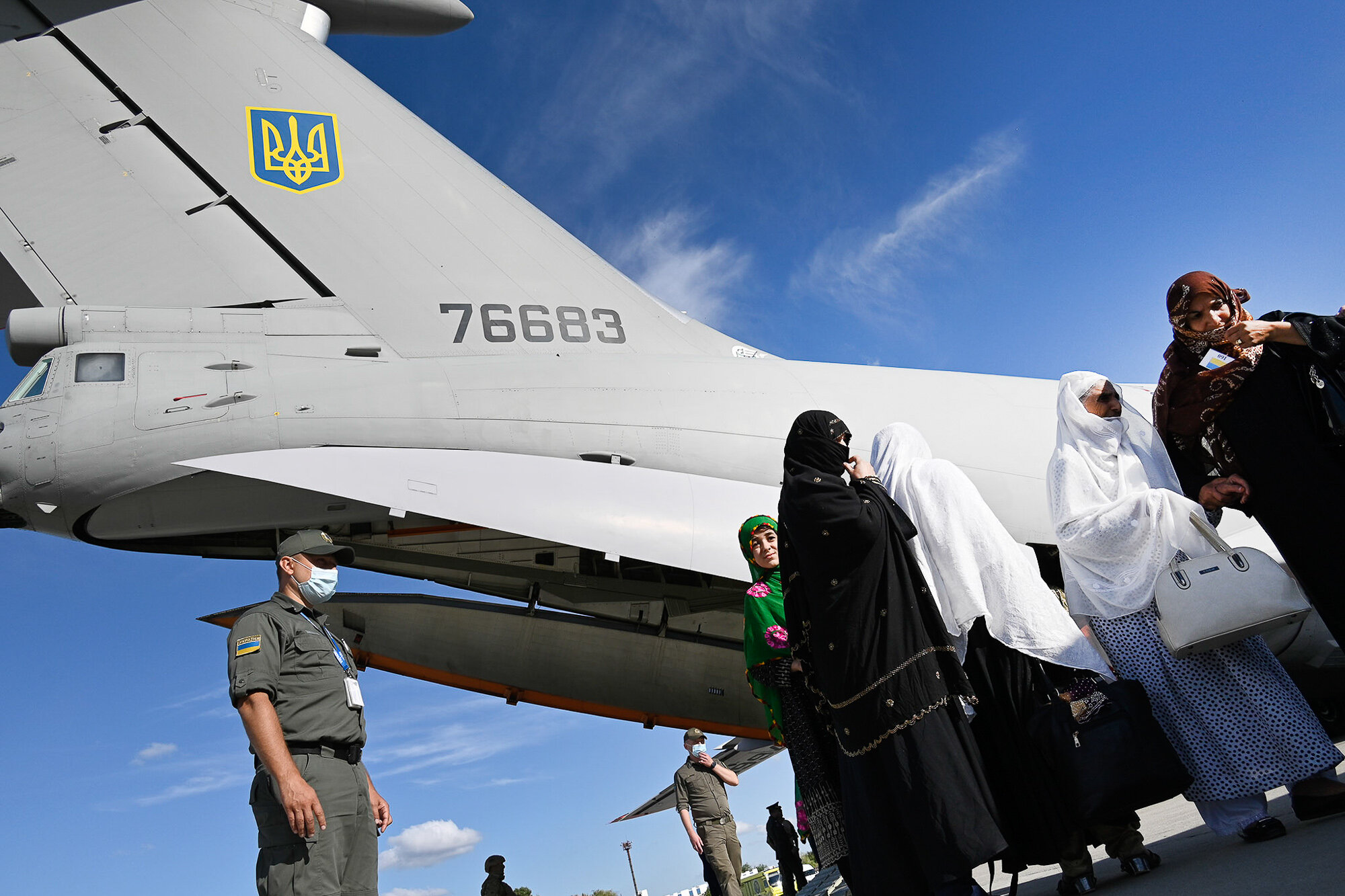On Aug. 31, the United States’ 20-year war in Afghanistan came to a chaotic end, with the complete collapse of the Afghan government.
As the last American soldier boarded his flight home, hundreds of thousands of people, including at least 200 Ukrainians and their family members, were left behind in a country now run by the Taliban — a radical Islamist movement that seized control of the country on Aug. 15.
The Ukrainian government has repeatedly promised to evacuate everyone who needs it. Over the past three weeks, six Ukrainian flights rescued 650 people from Afghanistan.
And yet, hundreds of Ukrainians and their loved ones remain stranded in Kabul. Many say they’ve been ignored by Ukrainian embassies and weren’t notified about evacuation flights until it was too late to catch them.
Many of these people fear for their lives as the Taliban imposes its fundamentalist rule and hunts down any foreigners suspected of working against it.
The Kyiv Post spoke to a Ukrainian family currently stranded in Kabul about their desperate attempts to come home, and what the Taliban’s rule means for those who can’t escape.
Forgotten in Kabul
“Dad, am I going to be slaughtered as well?” said a 10-year-old boy to his father Atif Raziki, 33, a Ukrainian citizen of Afghan descent, who has been desperately trying to evacuate him and his family from Afghanistan to Ukraine.
Raziki’s son, along with his brother and sister, saw a video of a Taliban fighter stabbing a boy in front of his mother in one of the Afghan cities. Scared for their lives, Raziki’s children have bombarded him with questions ever since.
Raziki joined his wife and kids in Afghanistan on Aug. 23, when he arrived from Ukraine to help them evacuate. While Raziki spends long periods of time working in Odesa, his family lives in Khost, a city some 230 kilometers to the south of Kabul.
Before leaving Ukraine, Raziki reached out to the Ministry of Foreign Affairs and added his family to the list of evacuees. After arriving in Afghanistan, he called the Embassy of Ukraine in Tajikistan, which manages evacuations, three times. First, Raziki confirmed that his family was on the list, and was told to wait for the embassy to contact him.
“Then people started leaving. I’d see vans just coming to pick people up and take them to the airport. And yet, no one is contacting me,” Raziki told the Kyiv Post.
A staff member at the embassy, “someone named Viktor,” told Raziki to stop calling him.
The only staff member named Viktor, according to the embassy’s website, is Viktor Semenov, who is the counselor to Ambassador Vasyl M. Servatiuk.
When reached for comment, Semenov told the Kyiv Post to contact the Foreign Ministry. When asked why, Semenov didn’t respond. According to the ministry, the embassy in Tajikistan is one of the key institutions responsible for evacuating Ukrainian citizens.
“Five days have gone by, everyone left, no one contacted us, and then I learned that the last Ukrainian plane has left,” Raziki said.
The last three Ukrainian planes landed in Kyiv on Aug. 28, bringing about 360 people to safety, including at least 80 Ukrainians.
Raziki’s family was left to wait.
‘They don’t know humanity’
On Aug. 16, the day after the Taliban seized control of the country, Ukraine’s Foreign Minister Dmytro Kuleba wrote that “Kabul airport right now is a place where it’s better not to be.”
Raziki and his family didn’t have the luxury to stay away from the airport. For seven days, they camped out there, from dawn to at least midnight, in the hopes of getting a call from the embassy and being able to swiftly get on a plane.
Under the scorching Afghan sun, Raziki’s family stood in huge, chaotic lines for hours, along with thousands of others trying to escape.
“I was beaten up (by the Taliban) every time I went to the airport,” Raziki told the Kyiv Post. “I was hit with sticks, batons, and hoses… Thank god this happened only to me, and not to my children. I was protecting them as best as I could.”

Taliban fighters guard outside the airport in Kabul on August 31, 2021, after the US has pulled all its troops out of the country to end a 20-year war. Dozens of Ukrainian citizens and their family members, at least 200 people altogether, remain stuck in Kabul, begging the Ukrainian government to evacuate them. (AFP)
“They’re terrifying people. They don’t know humanity. All they know is how to shoot, and they attack and shoot anyone they want.”
Raziki also said that Taliban fighters have been knocking on doors, searching for people who have worked for the government, as well as foreigners, which puts his family at an even greater risk.
Local authorities in Khost announced that from now on, girls can only attend school until grade six. “This was a big hit for me,” Raziki said. “They threaten my daughter’s future.”
He also said it is clear that the Taliban already began instilling their old customs — music is already being prohibited, and men are instructed to grow beards.
Ukraine’s evacuation efforts
Since the crisis in Afghanistan began, Ukraine evacuated over 650 people, including international journalists.
On Aug. 27, Ukrainian troops successfully conducted an evacuation operation rescuing 19 Canada-bound Afghan military translators and their families just hours after an Islamic State suicide bombing took 170 lives at the capital’s airport.
The evacuees were in grave danger due to their previous work with the Canadian military, making them a likely target for the Taliban.
Neither the Canadians nor the Americans were able to help — a total of three rescue missions failed before the Ukrainian special forces set off for Kabul on foot to escort two minibuses full of hopeful evacuees onto the airfield.
“We asked the Americans, the Canadians, the Qataris, everybody, and no solution. They were scared to come out,” said Jawed Haqmal who had worked with the Canadian special forces in Afghanistan. “The Ukrainian soldiers were angels for us. They did an exceptional job. They have big hearts.”
During a working visit to the U.S., Kuleba told journalists that the changing status of Ukrainians wanting to leave Afghanistan over the past few weeks has made it difficult to coordinate evacuation efforts.
“For example, two weeks ago, some people didn’t come forward, but then did so later. Others filed a request right away but then left on a different plane because an opportunity to do so came up. So, the number (of requests) fluctuates, but no one will be left behind,” Kuleba said.

Ukrainians and foreigners evacuated from Afghanistan disembark from a Ukrainian military plane IL-76MD “Oleksandr Bielyi” at Boryspil International Airport outside Kyiv, on Aug. 28, 2021.
Yet stories of those like the Raziki family point out that the blame is not so much on the changing minds of those still in Afghanistan but on the bureaucratic tangle people need to navigate to escape the war.
And Raziki is not alone.
Kyiv oblast native Mohammad Fareed contacted independent Ukrainian publication Zaborona with a plea for help to rescue his wife, three-year-old son and five-month-old daughter.
Fareed is in Ukraine, while the three of them have been queuing up by Kabul airport gates and trying to leave Afghanistan for several days to no avail.
Safi Zamar from the southern Ukrainian city Odesa is another one of those who happened to be in the wrong place, at the wrong time. He came to Afghanistan at the beginning of August to visit his family, only to find himself unable to leave. After spending the night waiting for a promised evacuation flight on Aug. 25, Zamar and many others were told to leave as rumors of an explosion began to surface. Those that stayed behind managed to board a flight just hours before the deadly suicide bombing.
Zamar tried to get a Ukrainian visa for his Afghan wife but ended up paying $1,050 for a rejection, with no refund.
Many Ukrainians remaining in Afghanistan have similar stories: “They couldn’t escape earlier with their families because the Ukrainian embassies in Dushanbe and Islamabad were rejecting their visas,” Zaborona wrote.
Ukrainian citizen Saidzai, who asked Zaborona not to publish his last name because he fears for the safety of his family, has a similar story. He arrived in Afghanistan from Odesa at the beginning of August. He told Zaborona that war is typical for Afghanistan but no one expected the situation to escalate so quickly. Rockets exploded around his house, leaving a wasteland of destroyed cars. A shooting that broke out near an airport prompted him to come back home. Out of a large family of 20, Saidzai hopes to at least be able to evacuate his wife and six children.

Ukrainians and foreigners evacuated from Afghanistan disembark from a Ukrainian military plane IL-76MD “Oleksandr Bielyi” at Boryspil International Airport outside Kyiv, on Aug. 28, 2021.
Foreign Ministry spokesperson Oleh Nikolenko told the Kyiv Post that Ukraine will continue evacuating its citizens after Aug. 31.
“The evacuation routes of our citizens can be altered, depending on the development of the situation at Kabul airport,” Nikolenko said. As the US withdrew all its soldiers, the airport is now controlled by the Taliban.
“We work 24/7 and will not leave anyone behind,” Nikolenko said.
In the meantime, the stranded citizens can only hope that the government will fulfill its promise.
“I am scared I will just be stuck here, and won’t be able to get out. I hope Ukraine will help us soon,” Raziki said.
“They have to take care of us.”
